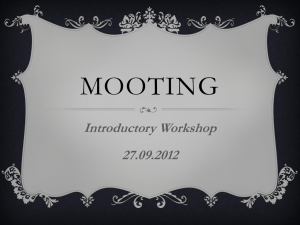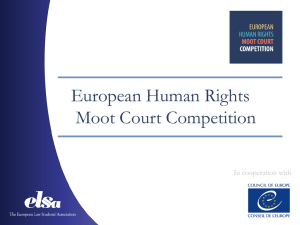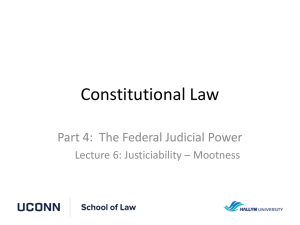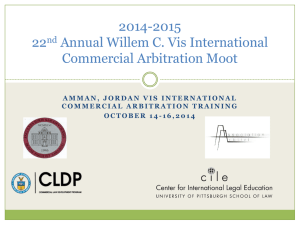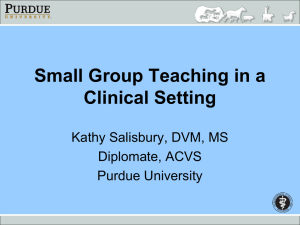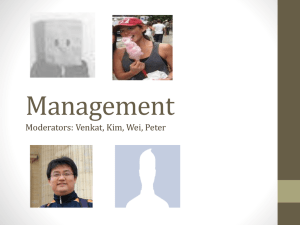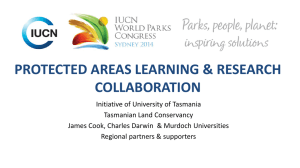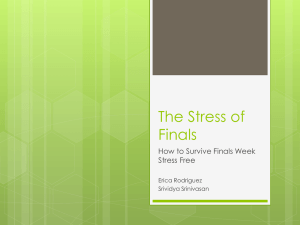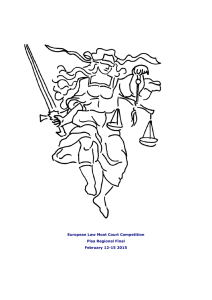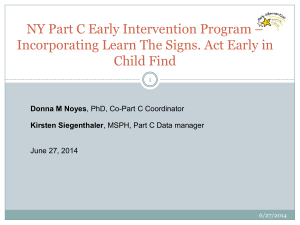Mooting at Murdoch Workshop
advertisement
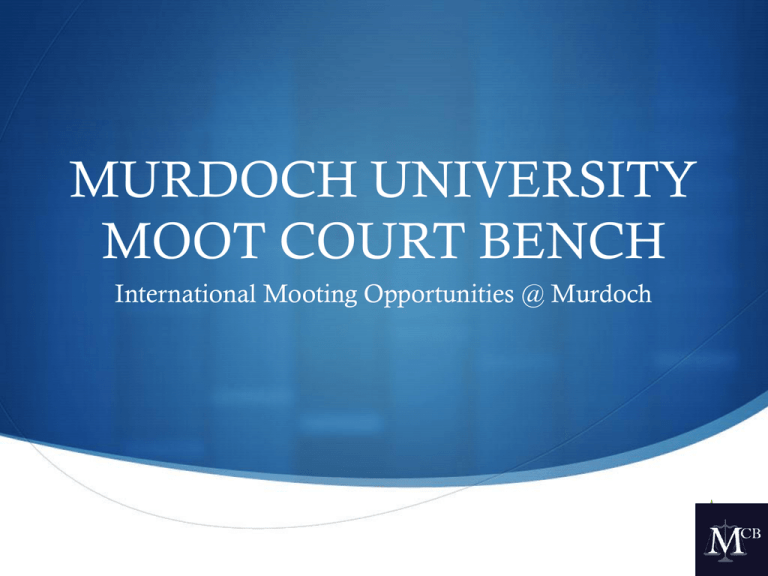
MURDOCH UNIVERSITY MOOT COURT BENCH International Mooting Opportunities @ Murdoch S Inter-State Moots S Administrative Appeals Tribunal Moot S Shine Lawyers Torts Moot S Hon. Michael Kirby Contract Law Moot S Sir Harry Gibbs Constitutional Law Moot Administrative Appeals Tribunal Moot S The Competition S Murdoch chooses two teams of three students each to compete in this moot S The moot scenarios focus on various areas of administrative law including immigration and citizenship, social security, veterans’ affairs, workers' compensation and taxation S The Tribunal conducts merits review which involves a complete reconsideration of the factual, legal and policy considerations relating to the decision under review Structure of the Moot S Team members will attend a Tribunal hearing prior to commencement of the competition to observe the role of counsel in the merits review setting S Each round will have a new question drawing on a different area of administrative law S The scenario for each round will be released one week before the competition date Structure (Con’t) S The first one or two rounds will be conducted at the Perth registry before a member of the Tribunal S Following the state or territory competitions, eight teams will enter the national finals with the grand final being held in Brisbane and adjudicated by the President of the Tribunal. Preparation and Mooting S Each round will require the preparation of written submissions (around 10 pages) S Competitors will complete a number of practice moots with the team coach S In each team two members will speak and one will act as solicitor S Each round is a knock-out Competition Timetable S 2014 Competition Timetable S Round 1: 5 – 7 August S Further rounds are held throughout August & September S Grand Final: 7 October Shine Lawyers Contract Moot S Type of Law S Torts law (LAW152) S Court of Appeal style moot S QUT in Brisbane S Finals held in Supreme Court S Very similar to Junior/Senior Mooting The Team S 1 Team S 3 Students Memorials S Not required to submit full written submissions S Outline of Appellants arguement S Respondent’s 2 weeks later S New outline for Semi Final/Grand Final S 4 Pages long S 10% of marks Structure S 4 moots S Semi Finals S Grand Final Awards S Winning team: $500 S Runner-up: $200 S Best Mooter in final round: $100 S Best Mooter in general rounds: $100 Hon. Michael Kirby Contract Moot S Type of Law S Contract Law S Simulation of an arbitration in a contract dispute S Written Memoranda and Oral hearings S Great competition to do to transition into big international ones Universities S 15 Universities S Monash S UWS S Griffith S Melbourne S ANU S UWA S 24 Teams The Team S 1 team S 3 members S Preparation time of approx 2.5 months Memorials S Memoranda are 15 pages long S Scored by S quality of the analysis; S persuasiveness of argument; S thoroughness of research; S clarity of the writing; and S adherence to the rules S Not given memos in elimination rounds Structure S 4 moots per team minimum S 2 each side S 2 per day S Top 16 to elimination rounds S Quarter Final- 8 S Semi Final- 4 S Grand Final- 2 Oral Hearings S 30 minutes for orals S 15 minutes per speaker Awards S The awards given in the moot are: S Award for the Winning Team in the Final Rounds S Award for the Runner Up Team in the Final Rounds S Award for the Best Individual Oralist in the Final Rounds S Award for Best Written Memorandum for Claimant S Award for Best Written Memorandum for Respondent S Honourable mentions will be made for: S The Highest Scored Team in the General Rounds S The Highest Scored Oralist in the General Rounds S The Highest Scored Oralist in the Final Rounds Timeline S Dates aren’t out yet… S 2013 dates were late September S Monday 23 September 2013: Opening briefing, general round S Tuesday 24 September 2013: Elimination round S Wednesday 25 September 2013: Semi-final round, final round and awards function Sir Harry Gibbs Constitutional Law Moot S Gibbs Constitutional Law Moot Team 2013 Gibbs Constitutional Law Moot Team 2012 The Competition S Team of 3 S Constitutional Law Question S Participants must have completed or undertaking LAW259 Constitutional Law S Almost every major University in Australia and NZ participates S Run by University of Canberra in ACT S Finals held in High Court Timeline S Actual Dates have not been confirmed S Traditionally held in October S Students need to be available in September & October. The Format S High Court First Instance Case S Plaintiffs and Defendants S 2 Speakers on each side S 4 General Rounds S 2 Rounds as Plaintiff & 2 Rounds as Defendant S Quarter Finals; Semi Finals S Grand Finals S Judged by Hon. Robert French CJ in 2013 The Benefits S Largest Domestic National Moot S Looks Great on your CV S Opportunity to Actually Appear in the High Court S For Grand Finalist S Social Events S 2013 Team enjoyed the following S S S Gala Night Cocktail Evening Pub Crawl International Moots/ Competitions S INADR International Mediation Tournament S International ADR Mooting Competition S International Maritime Law Arbitration Moot S International Institute of Space Law - Manfred Lachs Moot S Willem C. Vis International Commercial Arbitration Moot S Philip C. Jessup Public International Law Moot INADR International Mediation Tournament S About the Moot S 3 Competitors per team. S 56 Teams from around the world competed in 2014. S The INADR International Law School Mediation Tournament is organised annually by the International Academy of Dispute Resolution. S The competition was hosted in Chicago this year. S A unique aspect of this tournament is its strong focus on education and training, with students given the opportunity to participate in two days of advanced mediation training conducted professional mediators before the commencement of the competition rounds. Structure of the Moot S Teams of three students each go through three preliminary rounds serving as mediators, as well as advocates and clients. S Mediators work in pairs, with the co-mediators being from different schools S Mediators are judged on their ability to work together with their co-mediator in addition to their listening skills, their ability to help that advocates and clients see the strengths and weaknesses of their cases. S Advocates and clients are judged on their ability to present their case, to articulate their strengths and weaknesses, and to work with the mediators toward a solution while also meeting their needs and interests. Awards S The 2014 Murdoch team won awards for their overall results in both the lawyer/client and mediator categories of the competition, finishing as the 5th and 7th ranked teams overall in those categories. S The Murdoch Team was rank 6th best individual lawyer/client pairing, which was a ranking achieved against 168 individual pairings competing in the preliminary rounds. Finally, the team was awarded the H.Case Ellis Mediation Award. International ADR Mooting Competition S About the Moot S 3 people will be selected to represent Murdoch university. S The Moot is conducted by City University of Hong Kong in association with the China International Economic and Trade Arbitration Commission (CIETAC), Columbia University (New York), and UNCITRAL - Regional Centre for Asia and the Pacific. S It is run from 27 July to 2 August in Hong Kong The Format S In each round teams will be engaged in both mediation and arbitration. S In the moot, arbitration will be conducted first followed by mediation. At the conclusion of the arbitral hearing the two legal counsels for each side will divide their duties during the mediation with one acting as client and the other as attorney/legal counsel. S A third student from each university competing will act as an arbitrator and mediator for a different moot in which two other universities are competing. This student will serve initially as an arbitrator (one of three) sitting as the arbitral panel. Then the student will personally conduct the mediation that follows the arbitration. History S Murdoch has been very successful in this event. S Murdoch has won the following honors: S Winners: 2010 S Highest Ranked Team – General Rounds: 2012 S Runner Up: 2011, 2012 S Runner up Team – Memoranda: 2010 S Best Mediator: 2010, 2012 S Best Mediator – General Rounds: 2012 S Best Oralist – Arbitration Proceedings In Finals: 2012 S Best Oralist – Arbitration Proceedings: 2010, 2011, 2012 International Maritime Law Arbitration Moot S Features of the Competition S Created and run by Murdoch University S Murdoch teams are very successful S Supported by leading advocates Style S Arbitral Proceeding S Sitting Down S Mr or Madam President/ Arbitrator Type of Law S International Commercial Maritime Law S Jurisdiction and Merits Sections S Jurisdiction – Power of tribunal S Merits – Pirates; Ships Blowing up; Breach of Contracts; Negligence Universities S Murdoch University S University of Queensland S National University of Singapore S City University of Hong Kong S National Law School of India University S Others The Team S 4 Members Preparation Time S 7 Months MEMORIALS S Claimant v Respondent S 25 Pages Each Structure S 4 General Rounds S Quarter Finals S Semi Finals S Grand Final SPEAKING TIME S Two oralists per team per round S 40 minutes of speaking time S Divided how teams choose S Claimant’s rebuttal option AWARDS S Best Memorials S Oral Rounds S Highest Ranked Team in General Rounds S Best Speakers Awards International Institute of Space Law - Manfred Lachs Moot S LACHS S Created by the International Institute of Space Law S Has grown from 3 universities in 1992, to 60 universities worldwide STYLE S Jessup style moot S International Court of Justice S Acting as Applicant or Respondent TYPE OF LAW S Public International Law S Space Law – lex specialis S International disputes between States S COPOUS TEAM MEMBERS S 3 Members Length of Moot S 6 – 10 Months MEMORIALS S Applicant and Respondent S 35 pages or 9,000 words S Additional information included THE WAY IT RUNS S Regional Rounds between March and June S 4 teams (the winners from each regional round) compete in the world finals in Toronto, Canada S Held from 30 September to 2 October S Heard by 3 sitting members of the ICJ SPEAKING TIME S Two oralists per team per round S 30 minutes of speaking time in regional rounds S Divided as the teams choose S Applicant – rebuttal; Respondent = sur-rebuttal AWARDS S Awards given in World Final Round: S Best Memorial S Winner S Best Oralist Willem C. Vis International Commercial Arbitration Moot S Willem C. Vis International Commercial Arbitration Moot Vis S 4 team members S Early October to mid April S Travel to Vienna o More than 300 Universities from all over the world! About the Moot S International Commercial Arbitration S United Nations Convention on Contracts for the International Sale of Goods (CISG) o Questions of contract relating to the sale of goods under the CISG o Procedural/ Jurisdictional issues of arbitration Schedule S Friday, 4 October 2013 - Distribution of the Problem S Thursday, 12 December 2013 - Memorandum for claimant due S Thursday, 23 January 2014 - Memorandum for respondent due S Thursday, 10 April 2014 - Moot Alumni Association Welcoming Party S Friday, 11 April 2014 - Official Welcome and reception S Saturday - Tuesday, 12 – 15 April 2014 - General Rounds of argument S Tuesday evening - Wednesday – Thursday, 15 - 17 April 2014 - Elimination Rounds of argument S Thursday, 17 April 2014 - Awards Banquet Vis submissions S Written submissions o 35 pages each for claimant and respondent o Written memorials do not contribute to your score in the oral rounds of the competition S Oral submissions o 2 people from each team speak in each moot o 30 minutes to be divided for each teams oral presentation o o No right of rebuttal Oral rounds take place in: o o o Juridicum (Faculty of Law of the University of Vienna) DLA Piper Baker & McKenzie Phillip C. Jessup Public International Law Moot S The Competition S Jessup is the world’s largest and most prestigious mooting competition with participants from over 550 law schools in more than 80 countries S The moot simulates a dispute between countries before the International Court of Justice, the judicial organ of the United Nations S The moot scenario can cover any area of international law public Structure of the Moot S Competitors work in a team of 5 to research the scenario and produce written memorials S The scenario is released in mid-September and written submissions are submitted in January S Teams will compete in national qualifying rounds in order to make it to the international round in Washington D.C Structure (Con’t) S The Australian national oral rounds are held in Canberra before judging panels of experienced lawyers from the Attorney-General’s Department and DFAT S The top two teams from the national rounds will qualify to compete in the White & Case International rounds The Benefits S Provides competitors with advanced international research skills S Competitors will vastly improve written advocacy skills and the ability to develop concise and persuasive arguments S Competitors are given advanced oral advocacy training and the opportunity to test their skills before panels of highly qualified judges Benefits (Con’t) S Jessup is the moot that all firms know, and they know the level of work and commitment that goes into this competition S Networking opportunities are vest in the national rounds of Jessup and the competition is advantageous if competitors want to apply for positions in government departments The Expectation S The research and writing stage of Jessup takes place over the summer break and requires a disciplined commitment from competitors to get the work done! S You are representing yourself, your team mates and your University! Mooting Application Process For 2014 Winter Break / S2 Moots S What are we looking for in applicants? o Strong academic record o Demonstration of advocacy skills o Through participation in internal competitions and smaller moots o Ability to work in a team Applications S Two round of applications each year S Written Application including: o Application Form o CV o Academic Transcript *Written applications must be emailed to Michelle Barron no later than 5pm Friday 4 April* m.barron@murdoch.edu.au Applications cont. S Interview: o Interviews will be held on Saturday 12 April o Applicants will be advised of their interview timeslot on Tuesday 8 April o Panel of 3 moot coaches o Standard interview questions o Presentation of short 3 minute speech on any legal topic of their choice S Students will be advised of the team selections the following week Questions & Answers S
